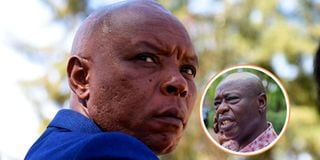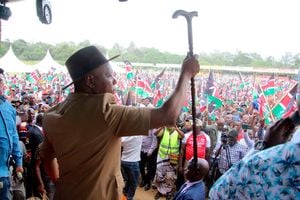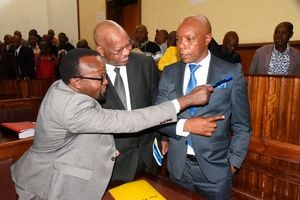
Former Mungiki leader Maina Njenga. Inset: Former Deputy President Rigathi Gachagua.
In the late 1990s and early 2000s, when the now outlawed quasi-religious group reigned supreme, the mere mention of the word "Mungiki" sent cold shivers down the spines of many a resident of Mt Kenya region and parts of Nairobi.
The group was associated with Mr Maina Njenga, its leader at the time but who has since proclaimed his Church affiliation and leadership of Amani Sasa Foundation.
Mr Njenga has over the years also plunged into politics — sometimes as a candidate, sometimes as a supposed kingmaker but often going against the grain.
On December 31, 2024 Mr Njenga once again declared his intention to insert himself at the heart of Mt Kenya politics with a declared mission: to check impeached Deputy President Rigathi Gachagua’s influence in the region and whip up support for President William Ruto.
The move has raised eyebrows given that in the run-up to the 2022 elections, Mr Njenga was a vocal critic of Dr Ruto and supported Azimio presidential candidate Raila Odinga. President Ruto eventually hogged the Mt Kenya vote as the team led by his running mate Rigathi Gachagua outsmarted Mr Njenga and other Azimio stalwarts from the region in the vote-hunt.
The recent Nyeri event that came at a time President Ruto and his Kenya Kwanza administration are seen as struggling to regain support in Mt Kenya after falling out with Mr Gachagua, has now raised questions on Mr Njenga’s game plan and whether he is a political dog of war or his own man. There are also fears that his renewed activities could give a new lease of life to Mungiki-like gangs in various guises.
“Mungiki,” a Kikuyu word derived from the word “Muingi,” which means “masses”, emerged as a religious movement, drawing inspiration from traditional Kikuyu culture and practices.
The objective of the outfit was to unite and mobilise the Central Kenya masses to fight what they perceived as mental slavery, which its members claimed was influenced by Christianity.
But with time, it became a quasi-religious criminal enterprise whose activities included extortion, intimidation, vigilantism and political hatchet jobs. From the Daniel Moi era through the Mwai Kibaki and Uhuru Kenyatta administration, the group’s activities have always sharply divided opinion.
Significantly, Mungiki gangs were also used in retaliatory attacks or community “defenders” during the 2007/2008 post-election violence.
The gang was eventually outlawed in the second term of the Kibaki administration — with then Internal Security Minister John Michuki at the forefront — and the sustained crackdown that followed crushed it after the extrajudicial killings and arrests of many members.
However, even after the ban and brutal crackdown, the group is thought to have gone underground and has often been used as a bogeyman. However, Mr Njenga — who has for years battled arrests, court cases and even alleged assassination attempts — rebranded as a preacher-cum-politician.
The youths who subscribe to the movement have maintained a love-hate relationship with politicians and residents of the Mt Kenya region: demonised when it is convenient and praised as defenders of the community when needed.
During his Mungiki heydays Mr Njenga teamed up with his cousin Ndura Waruinge but later parted ways. Mr Waruinge said he heard “a voice from God” that led him to abandon the group and subscribed to Christianity.
Mr Waruinge, now a preacher, is the spiritual leader of Synagogue Arena of Liberty Church.
Mr Njenga has since denounced Mungiki and dismissed speculations that Amani Sasa Foundation had links with the outlawed sect. In the run up to the 2022 General Election, Mr Njenga said he was a party leader and should be addressed as an Azimio co-principal.
“As we move forward, I don’t want you to address me as an ex-Mungiki leader, I am a principal of Azimio,” he said.
At various times, he has styled himself as the Mt Kenya kingpin and has flexed his muscles by holding meetings attended by hundreds of youths. His attempts to win a seat in elections have, however, flopped over the years.
He now goes by the title “chairman” since, he says, he leads a peaceful organisation which he says is meant to unite the mountain.
“We are talking about the unity of the Mt Kenya people, the Kikuyu, Embu, and Meru and I know we will unite and speak with one voice to champion our interest,” he said on Tuesday during a meeting at -Kabiruini show ground that drew hundreds of youths. During the meeting where tens of Kenyan flags were waved in a seemingly choreographed display by supporters drawn from various parts of the country, Mr Njenga called on residents of the Mt Kenya region to support President Ruto and other elected leaders in grassroots development efforts.
He dismissed claims that the region had abandoned the Kenya Kwanza administration following the impeachment of former Deputy President Rigathi Gachagua.
“The region remains united with the government,” Njenga said. “Contrary to rumors of mass defections, only one individual has parted ways with Kenya Kwanza.”
On Friday January 3, Nyeri Town MP Mr Duncan Mathenge, who is a close ally of President Ruto and voted to impeach Mr Gachagua in October 2024, told Nation Africa that leaders in Mt Kenya region who do not subscribe to the “confrontational” leadership of Mr Gachagua welcome Mr Njenga’s initiative to preach peace.
He noted that the region cannot afford to be in the opposition. The MP said Mr Gachagua is not the only second-in-command to lose the position, citing examples like Mr George Saitoti, Mr Josphat Karanja and even Mr Mwai Kibaki, who did not confront President Daniel Moi after they were dropped.
“The only person who lost the DP (vice president’s) position and took Mr Gachagua’s route was Jaramogi Oginga Odinga and it turned nasty on him and his community. We don’t want to go that route,” he said.
Mr Mathenge added: “However, our position also is that our youth should not get to a position where they confront the government and Njenga himself knows this since he was the leader of the proscribed group when it suffered a crackdown and youths killed. To the extent that he preaches peace and support of the government of the day, we will support him.”
However, Kikuyu Council of elders Chairman Mr Wachira Kiago described Mr Njenga as a “joker”, saying the people of Mt Kenya will not follow him.
“Our de facto leader is Rigathi Gachagua and we are solidly behind him. We will not be swayed to join Mr Njenga because we know he will not take us anywhere. At the same time, we are not opposed to the current Deputy President Kithure Kindiki who is also our son,” Mr Kiago told Nation Africa on Friday, January 3, 2025.Since Mr Gachagua’s impeachment on October 17, 2024, some Ruto-allied leaders in Central Kenya — particularly MPs who voted to kick him out – have faced hostility and have been branded traitors.
It is Mr Njenga's declaration that "jeshi" (army) allied to him will give security to some legislators when they tour the grassroots, that has sent cold shivers down the spines of leaders. Mr Njenga said the protection was necessary so that the MPs can oversee implementation of President Ruto’s projects and engage with the local community to safeguard National Government Constituency Development Fund (NG-CDF) resources.
He vowed to launch a political onslaught on Mr Gachagua. However, political pundits have questioned why President Ruto’s administration, whether directly or indirectly, has turned around and is now relying on Mr Njenga in Mt Kenya region in what appears to counter Mr Gachagua’s growing influence.
“The group might not currently be involved in criminal activities but the challenge might arise when all their needs are not met,” said a political analyst who spoke on condition of anonymity citing sensitivity of the matter.
Some Kikuyu elders have also warned that the group might turn into its old ways, saying they would be vigilant and ensure it does not happen.
“We will watch their activities keenly after that meeting. We as elders are not opposed to their support of the government and implementation of projects but we will not allow them to turn into criminals. This is because they will later be targeted by the same state for crackdown,” said an elder who also requested anonymity over security concerns.
Mr Njenga latest political moves have raised eyebrows, as President Ruto’s fierce critic now turned his greatest defender. Mr Njenga has over the past two years been hounded by the security agents, and was charged with possession of illegal weapons. However, this case was withdrawn in November last year.
After the 2022 general elections Mr Njenga became among the first victim of the Kenya kwanza’s persecution of opposition voices owing to his strong influence especially to the youth in Mt Kenya.
It did not take long before the administration began cracking down on his supporters and finding reasons that warranted his prosecution in court.
The serious charges of possession of firearms and his alleged membership to an outlawed criminal gang Mungiki made sure to keep him busy battling for his freedom in Nakuru and Nairobi courts. Many times Njenga would be summoned for interrogations at the Directorate of Criminal Investigations headquarters in Nairobi alongside his close aides and associates.
Mr Njenga indicated last year his intention to announce the direction that the Mount Kenya community would take in January.










